![]()
Outings and Explorations
Immerse Yourself in the Canyons, Cultural Sites & Rock Art of Southeastern Utah’s Cedar Mesa
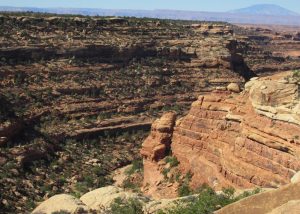 When: Sunday, May 17 to Friday, May 22, 2026
When: Sunday, May 17 to Friday, May 22, 2026- Price: $1,200 (Deposit: $200) ($460 tax-deductible)
- Leader: Linda Siegle (+ 2 SFCT staff)
- Spaces Available: Seven People
- Registration Opens January 16, 2026 at 9am at this webpage
- Medical Form
- Participant Release Form
- Please note: Due to limited capacity and strong interest each year, registration priority will be reserved for those who have not previously attended. This helps ensure that as many people as possible have the chance to experience Bears Ears for the first time. If you have previously attended and are interested in the 2026 trip, please email after 9am on Friday to be signed up on the waitlist. Your enthusiasm speaks to the power of the place! Thank you for understanding.
- If this event is full, and you would like to be placed on the waiting list, please email .
Get ready for a five night camping trip with four days of hikes and explorations at Cedar Mesa, part of Bears Ears National Monument in southeastern Utah!
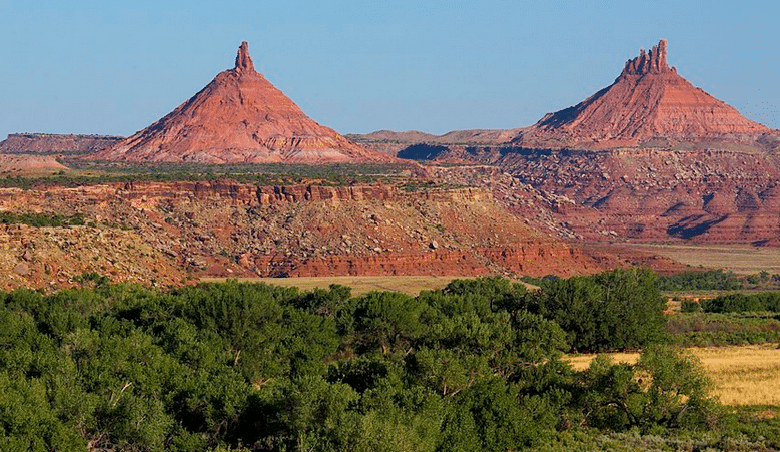
Indian Creek Canyon and Sixshooter Peaks
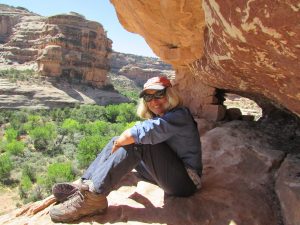 Led by our experienced guide, Linda Siegle, you’ll be amazed at the prolific rock art that scales the canyon walls. We’ll hike through the southwest’s most colorful canyons to find hidden ruins. During the evenings, see the Milky Way blazing a trail across a night sky that the ancestors of this ancient place revered.
Led by our experienced guide, Linda Siegle, you’ll be amazed at the prolific rock art that scales the canyon walls. We’ll hike through the southwest’s most colorful canyons to find hidden ruins. During the evenings, see the Milky Way blazing a trail across a night sky that the ancestors of this ancient place revered.
- It’s a wonderful opportunity to take pictures, explore a magnificent setting and learn the stories told by the land.
- Delicious meals are provided by the leaders and prepared by all.
- Participants will meet SFCT staff and trip leader at Kane Gulch Ranger Station in Bears Ears. Transportation in SUVs will be provided each day from the campground to all the trailheads.
Background
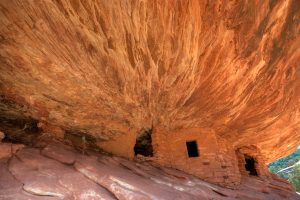
House on Fire ruin at Cedar Mesa
Part of the mission of the Santa Fe Conservation Trust is to ignite people’s passion for nature. What better way to do it than by exploring the numerous canyons and cultural sites at Cedar Mesa at Bears Ears National Monument!
People have been living in the Bears Ears region from as far back as 8,500 years ago. The more permanent residents, the ancestral Puebloans, began occupying the area at least 2,500 years ago, and vestiges of their kivas, towers, dwellings, pottery and weapons still remain on Cedar Mesa.
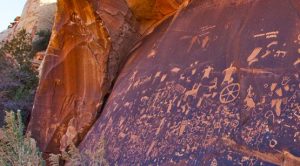
Newspaper Rock
The petroglyphs and pictographs date back 5,000 years. Some protected walls of the canyons feature artwork spanning the range of styles and traditions showing every style from the archaic to the more recent rock art left by the Ancestral Puebloans, Ute, Navajo and Paiute peoples.
The geology of southeastern Utah is outstanding. You will see high mountain tops to broad mesas, winding canyons, hoodoos standing guard, stone arches, natural bridges and verdant wetlands. Fossils on Cedar Mesa remind us that 300 million years ago, this area was once a tropical sea with a thriving coral reef. Cedar Mesa itself was part of a seaside desert where large, mammal-like reptiles burrowed into the sand to escape the heat at the end of the Permian period.
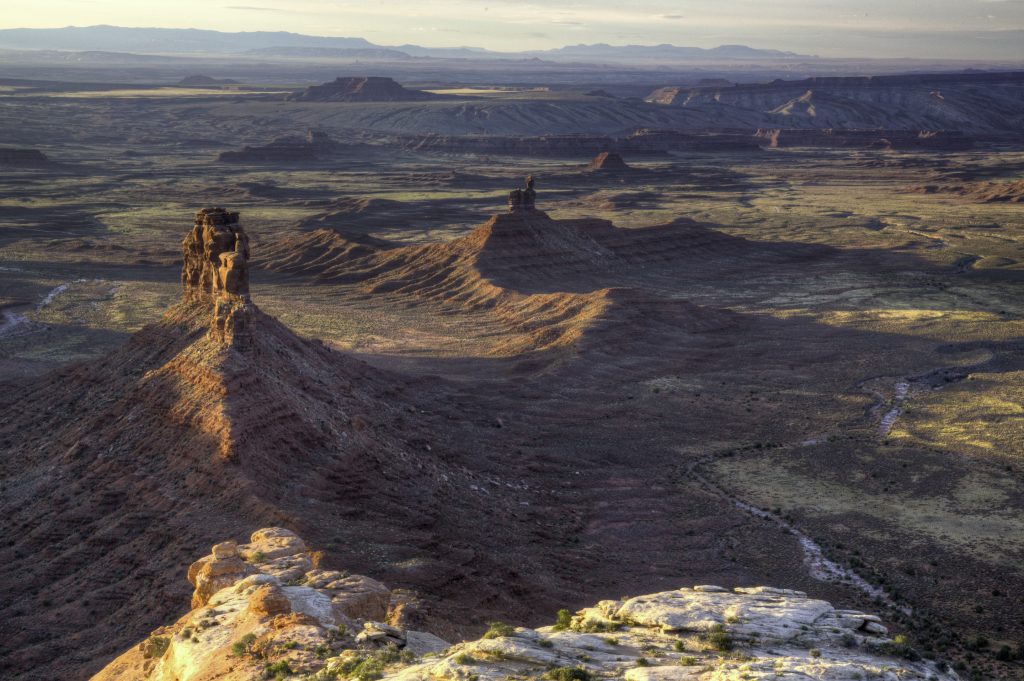
Valley of the Gods
From earth to sky, Cedar Mesa lets us experience what the ancestors revered: an area capable of providing subsistence for an incredible diversity of plants and animals, where water could be captured and filtered from passing storms. The Navajo refer to such places as “Nahodishgish,” or places to be left alone. What a blessing to be able to visit this amazing place with a guide who has been exploring the hundreds of canyons for over three decades.
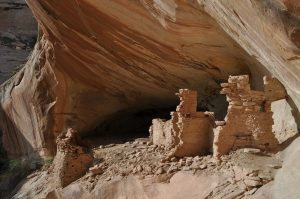
Monarch cave ruin
Linda says our hikes will take us into some enormous alcoves shaped by towering sandstone walls. In these canyons are vibrant riparian communities for hundreds of species including golden eagles. And the diverse soils and microclimates of the canyons host a huge variety of vegetation. Keep your eyes open for bighorn sheep, cottontails, foxes, coyotes, bobcats, shrews, tassel-eared squirrels or at night one of the 15 species of bats. Linda said they once saw bear tracks in South Mule Canyon.
In 2016, President Barack Obama declared that 1.3 million acres of this amazing terrain would become the Bear’s Ears National Monument. In 2017, the Trump administration reduced it to just under 202,000 acres, opening much of it to mineral and geothermal leasing. Thankfully in 2021 the Biden administration restored protection for 1.36 million acres. Come with us in May and experience the wonders of this landscape and let it ignite your own passion for nature!
May is a perfect time for visiting Cedar Mesa. The days are cooler, and the nights are perfect for bundling up in your sleeping bag. It is generally dry but be prepared for the swings of nature that can occur in the high desert.
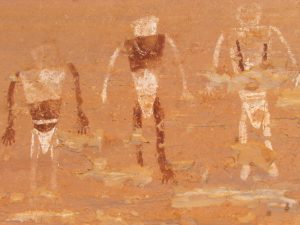 Itinerary
Itinerary
Our goal is to hike different canyons each day to view the incredible geology and explore Ancestral Puebloan dwellings, looking for rock art everywhere.
Our day starts early to fix breakfast and prepare lunches for the day’s hike. We will drive as a group to each day’s trailhead which will take between 30 and 45 minutes. At the end of the day, we will return to camp by approximately 4:00 p.m., perhaps a bit later some days. If time allows we may also include a visit to the incredible museum at Edge of the Cedars State Park that features one of the most impressive collections of Ancestral Puebloan artifacts in the region.
Hikes (dependent on weather and group interests/abilities) may include:
Procession Panel – The trail to Procession Panel climbs up slickrock to the top of Comb Ridge where you enjoy great views and will see over 170 petroglyph figures including the main panel showing a large group of people side by side in a procession. Approximately 3 miles long with 650-foot gain.
Split Level Ruins – Split level ruin is a double alcove with habitation rooms on two levels one above the other. There are numerous metates in large boulders, sharpening groves and rock art everywhere. Rock art ranges from archaic through pueblo periods.
South Mule Canyon – This hike along a canyon wash and benches showcase rock art and numerous ruins, sheltered in alcoves and beneath overhangs along the canyon’s walls. The trail heads up the wide shallow canyon, with walls composed of alternating layers of red and white sandstone, which are initially 80-ft. high but rise to heights of 500-ft. toward the upper reaches, about 5 miles from the trailhead.
Citadel Ruin – This 6-mile round trip hike leads to an impressive fortification that sits at the end of a peninsula. The only access to the ruin is via a land bridge that runs the length of the peninsula and requires some scrambling down a section of slick rock but ultimately leads to the beautifully preserved Citadel Ruin and beautiful vistas all along the way.
West Fork of Upper Butler Wash & Cave Tower – This 3 mile hike in Upper Butler Wash, partially shaded by cottonwood trees, leads to four sets of ruins and is lesser known than many other hikes in the region. With ruins along both sides of the wash, binoculars may be helpful to view across to inaccessible areas.
The Cave Tower hike is a short 1 ½ mile trek to a site where you’ll see the remains of the few towers still standing in all of Cedar Mesa. With no obvious villages or dwellings nearby, the reason for these towers, possibly defensive or lookout posts, remains unclear.
Wolfman Panel – The Wolfman Panel is a petroglyph site that consists of multiple images that were precisely inscribed into the dark patina of the cliff. There are also a few remaining walls of a cliff dwelling across the wash that are passed on the hike.
Sand Island & Upper Sand Island – Petroglyphs at the site include Archaic, Ancestral Puebloan, Navajo, Ute and perhaps a couple of wooly mammoths and a bison from the Clovis period. This comparison of the wide-ranging styles of images at one location is quite unusual.
Trip Logistics
Transportation: Participants will be responsible for driving their own vehicles (and may want to consider car-pooling with others) to meet the group at the Kane Gulch Ranger Station in Bears Ears. SFCT staff will meet you there and will lead you approximately 1 mile to a primitive BLM campground.
Gear and Food: Participants will need to bring their own tents, sleeping bags/pads, day packs, camp chairs (please see Equipment List) as well as clothing for all weather, rain gear and broken-in hiking boots. SFCT will provide all food, water, cooking equipment, fuel and first aid supplies. The campground is primitive with outdoor latrines and no running water – though water is available at the Ranger Station. Participants may want to bring a solar shower to clean up after hiking.
SFCT will try to accommodate food preferences and allergies (see Meals) but please inform SFCT in advance of any food restrictions. All participants will share in meal preparation and clean up duties during the week. Participants will prepare and pack their lunches and snacks each day to carry, along with ample water (3+ liters), in their day packs.
Hike Specifics
The trip includes incredible scenery and to fully enjoy it we will be hiking up to 6 miles each day. Hiking in the desert can be challenging due to sand, mud, brush, and heat, and our hikes will be moderately strenuous. The terrain we will cross will include canyon bottoms that may be muddy and thick with brush, and sandstone which may have a steep angle or be near edges, thus requiring a good sense of balance and minimal fear of heights. Some scrambling over rocks may be required to reach ruins.
Our day packs may weigh as much as 20 pounds since we each must carry our lunch and snacks for the day, plenty of water, and other personal items.
To fully enjoy this trip, participants must understand the physical challenges involved. All participants should be reasonably fit and may want to train for the hikes.
Completion of the SFCT Medical Form is required to ensure this is an appropriate trip for you to consider. Please speak to SFCT staff if you have concerns about physical limitations or hike requirements.
Trip Reservations
Registration opens for the 2026 trip on Friday January 16th at 9 AM and space is limited. A $200 deposit per person is required to hold your reservation. Each individual must complete and return the Medical Form within 5 days of registration. We review this information to ensure compatibility with the physical nature of trip and confirm of your reservation. All participants will be required to complete and submit the SFCT Trip Participant Release form. The remaining trip fee balance of $1,000 will be due on Friday, April 17, 2026 (30 days prior to departure). Of the full $1,200 price, $460 is tax-deductible. Cancellations made at least 30 days prior to departure will result in a complete refund. In the case there is interest in the trip beyond our trip capacity, a waiting list will be established and you will be notified if space becomes available.
Additional Information
President Barack Obama’s Proclamation Establishing the 1.3 million acre Bears Ears National Monument in 2016: https://www.blm.gov/sites/blm.gov/files/documents/files/2016bearsears.prc_.rel_.pdf
President Donald Trump’s Proclamation Cutting Bears Ears National Monument to 201,876 acres in 2017: https://www.whitehouse.gov/presidential-actions/presidential-proclamation-modifying-bears-ears-national-monument/
Bears Ears National Monument Official Website: https://www.blm.gov/visit/bears-ears-national-monument
President Biden’s Proclamation restoring Bears Ears National Monument Oct 8, 2021 https://www.whitehouse.gov/briefing-room/presidential-actions/2021/10/08/a-proclamation-on-bears-ears-national-monument/

